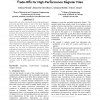Free Online Productivity Tools
i2Speak
i2Symbol
i2OCR
iTex2Img
iWeb2Print
iWeb2Shot
i2Type
iPdf2Split
iPdf2Merge
i2Bopomofo
i2Arabic
i2Style
i2Image
i2PDF
iLatex2Rtf
Sci2ools
104
click to vote
DSN
2005
IEEE
2005
IEEE
Engineering Over-Clocking: Reliability-Performance Trade-Offs for High-Performance Register Files
Register files are in the critical path of most high-performance processors and their latency is one of the most important factors that limit their size. Our goal is to develop error correction mechanisms at the architecture level. Utilizing this increased robustness, the clock frequencies of the circuits are pushed beyond the point of allowing full voltage swing. This increases the errors observed due to noise and other external factors. The resulting errors are then corrected through the error correction mechanisms. We first develop a realistic model for error probability in register files for a given clock frequency. Then, we present the overall architecture, which allows the error detection computation to be overlapped with other computation in the pipeline. We develop novel techniques that utilize the fact that at a given instance many physical registers are not used in superscalar processors. These underutilized registers are used to store the values of active registers. Our sim...
Computer Networks | DSN 2005 | Error Correction Mechanisms | Error Detection Computation | Register File |
| Added | 24 Jun 2010 |
| Updated | 24 Jun 2010 |
| Type | Conference |
| Year | 2005 |
| Where | DSN |
| Authors | Gokhan Memik, Masud H. Chowdhury, Arindam Mallik, Yehea I. Ismail |
Comments (0)

